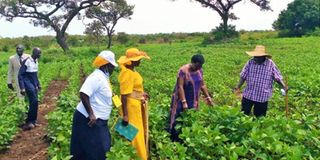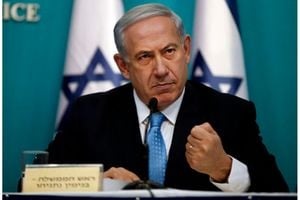Ex-combatants ask for govt support

Ms Grace Freedom Kwiyucwiny, the State Minister for Northern Uganda (right) and other officials inspect soybean plantations of ex-combatants in October. PHOTO | ROBERT ELEMA
Twenty years ago, guns went silent after the government signed a peace agreement with the Uganda National Rescue Front II (UNRF II. Under the amnesty agreement, the government pledged to provide resettlement packages to the former rebels, among other facilitations.
However, to date, the ex-combatants say they are yet to get what was promised.
Two other rebel groups, UNRF I, which was led by the current Deputy Prime Minister Moses Ali and the West Nile Bank Front led by Juma Oris, also operated in the district. Former combatants of the two groups also say they have not been given their resettlement packages.
Further more, the war survivors also say they have been neglected by the government.
Some of the ex-combatants and war survivors who spoke to Daily Monitor, said the government should facilitate them to engage in commercial farming.
They said government should provide them with agricultural equipment such as tractors to help cultivate their land.
During a training organised by the Amnesty Commission on Tuesday in Yumbe District, one of the war survivors, Mr Muhammad Anule, 59, of Likichonga Village in Barakala Town Council in Yumbe District, said he has about 20 acres of land but cannot make use of it since he lacks the resources to cultivate it.
“I have a plan of growing fruit and other softwood trees in this land but it’s not easy. I have only utilised about five acres because I am using rudimentary tools such as a hand hoe. I request the government to support us with [modern] agricultural equipment,” he said.
Mr Bran Abibu, the coordinator of former UNRF II ex-combatants under, said the agricultural activities they have undertaken have enabled them to cater for their families. But added that government support would go a long way in improving their livelihoods.
Mr Abibu said they have mobilised the ex-combatants, who are more than 150 and the group has already established two farms in the district but that they are constrained by resources.
While justifying their demand for tractors, Mr Abibu said: “We first planted chia seeds in a six-acre piece of land at Gurua farm in Aria Sub-county and later planted cassava where we raised about Shs4 million. We went ahead to open another 12-acre piece of land in Romogi Sub-county where we have planted soybeans. If the government could support us with agricultural equipment, we would be opening upto 5,000 acres of land because there is a lot of land lying idle in Yumbe.” Mr Abibu said they have used the proceeds from the farms to feed their families and sold the excess to cater for other needs.
The Yumbe District chairperson, Mr Abdulmutwalib Asiku, said the government should consider supporting the ex-combatants in their initiatives as a way of giving back to them for embracing the peace agreement.
“To ensure that we engage in agriculture at a commercial level, the Ministry of Agriculture should procure tractors and other farm implements,” he said.
During the signing of the peace agreement in 2002, more than 10,000 ex-combatants were demobilised, with some joining Uganda People’s Defence Forces (UPDF) while others were integrated into the communities.
The Amnesty Commission officer-in-charge for West Nile, Lt Col Obitre Gama, said while they lack the resources, they have extended skills to the ex-combatants and the war victims.
“Without training or skills, it would be hard for the ex-combatants to survive. About 10 years ago, we had many partners and donors supporting the Amnesty Commission. Every time we trained, we would give them start-up kits and tools for carpentry, metal and welding and also seedlings but such support is no longer there,” he said.
The Amnesty Commission in its 20-year existence has received, resettled and reintegrated about 6,000 ex-combatants of UNRF II in Yumbe District, which was a hotbed of rebel activity against President Museveni’s regime.




